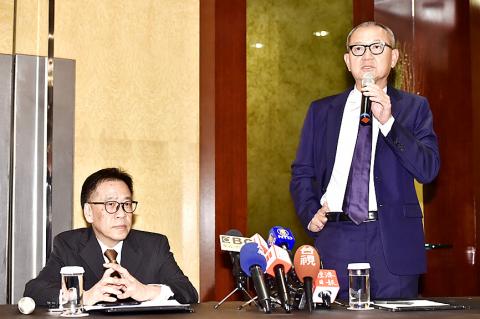Yageo Corp (國巨) yesterday said its US$1.64 billion acquisition of Kemet Corp would help it break into the high-end automotive, industrial and 5G components segments.
The deal is expected to boost the company’s net profit by at least 80 percent and double its revenue to about US$3 billion when it is completed in the second half of next year, the world’s third-largest supplier of multilayer ceramic capacitors (MLCC) told a media briefing in Taipei.
It announced earlier in the day that it would acquire all of Kemet’s common shares at US$27.2 per share in an all-cash transaction.

Photo: Tu Chien-jung, Taipei Times
Yageo has entered a definitive agreement with Kemet and the transaction has been approved by both companies’ board of directors, it said.
“The acquisition of Kemet helps Yageo find the last missing piece of its MLCC portfolios in automotive and industrial devices, which are dominated by European and Japanese suppliers,” Yageo chairman Pierre Chen (陳泰銘) said.
“Yageo has been squeezing profits by boosting volumes and improving [operational] management in the past. Now, the company finally gets the chance to have a taste of the cream of the crop,” he said.
Despite having a 2 percent share of the global MLCC market, Kemet generated almost the same level of annual revenue as Yageo, indicating that the US company delivered average selling prices that are 20 times higher than Yageo’s, Chen said.
Yageo has a 13 percent share of the global market.
Kemet also has great exposure to MLCCs used in 5G base stations, an area with rapid growth potential, he said.
The acquisition would play a crucial role in Yageo’s growth over the next five to 10 years, Chen said.
With diverse product lineups and technology, Yageo would be better prepared to weather industry downturns and keep its bottom line stable, he said.
Commenting on the company’s outlook, Chen said inventories have been falling faster than expected, “which is a strong sign that demand is shaping up well.”
Yageo expects inventory turnover of finished goods to drop to fewer than 60 days this quarter, from as high as 170 days, he said.
Last month, the company raised its business outlook and said inventory turnover would fall to 70 days this quarter.
Yageo has lowered factory utilization to 25 percent over the past three quarters to cope with excess inventory, Chen said.
It would take time to raise utilization from that level, given labor shortages in China, he said.
The company expects to return to growth in annual revenue in the first quarter of next year, if labor recruitment goes smoothly.
Yageo said net profit last quarter grew 5 percent to NT$2.04 billion (US$67.06 million), compared with NT$1.42 billion in the second quarter.
On an annual basis, net profit plunged almost 86 percent from NT$14.5 billion.
Earnings per share rose to NT$4.81 from NT$3.34 a quarter earlier, but declined from NT$34.35 a year earlier.
Gross margin dropped to 31 percent from 32.6 percent in the second quarter and 69.3 percent in the third quarter of last year, the company said.

CHIP RACE: Three years of overbroad export controls drove foreign competitors to pursue their own AI chips, and ‘cost US taxpayers billions of dollars,’ Nvidia said China has figured out the US strategy for allowing it to buy Nvidia Corp’s H200s and is rejecting the artificial intelligence (AI) chip in favor of domestically developed semiconductors, White House AI adviser David Sacks said, citing news reports. US President Donald Trump on Monday said that he would allow shipments of Nvidia’s H200 chips to China, part of an administration effort backed by Sacks to challenge Chinese tech champions such as Huawei Technologies Co (華為) by bringing US competition to their home market. On Friday, Sacks signaled that he was uncertain about whether that approach would work. “They’re rejecting our chips,” Sacks

It is challenging to build infrastructure in much of Europe. Constrained budgets and polarized politics tend to undermine long-term projects, forcing officials to react to emergencies rather than plan for the future. Not in Austria. Today, the country is to officially open its Koralmbahn tunnel, the 5.9 billion euro (US$6.9 billion) centerpiece of a groundbreaking new railway that will eventually run from Poland’s Baltic coast to the Adriatic Sea, transforming travel within Austria and positioning the Alpine nation at the forefront of logistics in Europe. “It is Austria’s biggest socio-economic experiment in over a century,” said Eric Kirschner, an economist at Graz-based Joanneum

BUBBLE? Only a handful of companies are seeing rapid revenue growth and higher valuations, and it is not enough to call the AI trend a transformation, an analyst said Artificial intelligence (AI) is entering a more challenging phase next year as companies move beyond experimentation and begin demanding clear financial returns from a technology that has delivered big gains to only a small group of early adopters, PricewaterhouseCoopers (PwC) Taiwan said yesterday. Most organizations have been able to justify AI investments through cost recovery or modest efficiency gains, but few have achieved meaningful revenue growth or long-term competitive advantage, the consultancy said in its 2026 AI Business Predictions report. This growing performance gap is forcing executives to reconsider how AI is deployed across their organizations, it said. “Many companies

France is developing domestic production of electric vehicle (EV) batteries with an eye on industrial independence, but Asian experts are proving key in launching operations. In the Verkor factory outside the northern city of Dunkirk, which was inaugurated on Thursday, foreign specialists, notably from South Korea and Malaysia, are training the local staff. Verkor is the third battery gigafactory to open in northern France in a region that has become known as “Battery Valley.” At the Automotive Energy Supply Corp (AESC) factory near the city of Douai, where production has been under way for several months, Chinese engineers and technicians supervise French recruits. “They